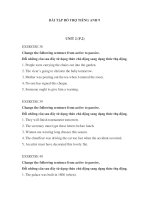BÀI TẬP BỔ TRỢ TIẾNG ANH 9 UNIT 2 (P.2)
Bạn đang xem bản rút gọn của tài liệu. Xem và tải ngay bản đầy đủ của tài liệu tại đây (84.75 KB, 7 trang )
BÀI TẬP BỔ TRỢ TIẾNG ANH 9
UNIT 2 (P.2)
EXERCISE 38
Change the following sentence from active to passive.
Đổi những câu sau đây từ dạng thức chủ động sang dạng thức thụ động.
1. People were carrying the chairs out into the garden.
2. The vicar’s going to christen the baby tomorrow.
3. Mother was pouring out the tea when I entered the room.
4. No one has signed this cheque.
5. Someone ought to give him a warning.
EXERCISE 39
Change the following sentence from active to passive.
Đổi những câu sau đây từ dạng thức chủ động sang dạng thức thụ động.
1. They will finish tournament tomorrow.
2. The secretary must type these letters before lunch.
3. Women are wearing long dresses this season.
4. The chauffeur was driving the car too fast when the accident occurred.
5. An artist must have decorated this lovely flat.
EXERCISE 40
Change the following sentence from active to passive.
Đổi những câu sau đây từ dạng thức chủ động sang dạng thức thụ động.
1. The palace was built in 1806 (when).
2. The farm was destroyed by fire (how).
3. The merchandise will be delivered next week (when).
4. The old curiosities had been stolen by one of guards (by whom).
5. His little son was finally found in the garden (where).
EXERCISE 21
1. Fred has gone to Mexico.
2. Bob and George have decided to leave room.
3. Sue has had a baby.
4. Nam has given up smoking.
5. Tom has passed his exams.
EXERCISE 22
1. Jack has forgotten his name.
2. Have you washed your hair?
3. Helen is on holiday. She has gone to Canada.
4. Have you just arrived?
5. He has lost his keys.
EXERCISE 23
1.She has lost her purse.
2. She has washed her hair.
3. He has lost weight.
4. It has run out of petrol.
5. He has broken his leg
EXERCISE 24
1. No thank you. I’ve just had dinner.
2. Yes, I’ve just seen him.
3. Yes, she’s just phoned.
4. No thanks, I’ve just put one out.
5. Yes, he just gone to Finland.
EXERCISE 25
1. I’ve already phoned her
2. I’ve already read it
3. No, I’ve already paid him.
4. I’ve already posted it.
5. I’ve already given it.
EXERCISE 26
1. Have you read a magazine recently?
2. Have you met Alice in the last few days?
3. Have you played the guitar recently?
4. Have you eaten the fish today?
5. Have used visited any good sights recently?
EXERCISE 27
1. I haven’t seen it yet. But I’m going to seen it.
2. I haven’t eaten there yet but I’m going to eat there.
3. I haven’t bought one yet but I’m going to buy one.
4. He hasn’t asked her yet but he’s going to ask her.
5. I haven’t met them yet but I’m going to meet them.
EXERCISE 28
1. It’s the second time she has phoned him this evening.
2. It’s the third time you have been late this week.
3. It’s the third time the motor bike has broken down this month.
4. It’s the fifth cup of tea she has had this morning.
5. It’s the fourth time I’ve looked for him this week.
EXERCISE 29
1. That novel was written by Mrs Allen.
2. A lot of jungles were destroyed by fire.
3. The vaudeville was enjoyed very much by the audience.
4. The reference book was taken from the shelf by Nam.
5. The notice board will be delivered by Hai.
EXERCISE 30
1. His composition has been finished by Henry.
2. The tickets will be left at the box office by the children.
3. A box flower has just been left for you by the messenger.
4. The bandits were easily captured by the police.
5. The course was attended by few students.
EXERCISE 31
1. We were disappointed very much by the play.
2. The export division is managed by Mrs Baker.
3. I was paid the money by Jack.
4. Two loaves of bread were eaten by the little boy.
5. The picture book was bought in Kerry’s by Janet.
EXERCISE 32
1. Our exercises are corrected at home by the teacher.
2. A dancing class was started last week by the boys.
3. Mary was met at the dance by George.
4. The letter was left on the desk (by him).
5. The Picasso exhibition will be soon seen.
EXERCISE 33
1. The lecture has been just finished by Mrs Brown.
2. The war was usually flowed by an economic crisis.
3. My fountain pen has been taken.
4. Our written work was returned to us by our form teacher.
5. Her precious purse has been lost by this woman.
EXERCISE 34
1. The report had been finished by noon by Alice.
2. The thief was bitten by the mad dog.
3. The smoke was blown away by the strong wind.
4. Mr Sang has been chosen for president by the election committee.
5. A lot of dishes were broken by the maid servant.
EXERCISE 35
1. Those maps must be finished by seven o’clock.
2. It should be sent to me immediately (by her).
3. The mail is being now delievered by the mailman.
4. That package has to be returned today (by him).









